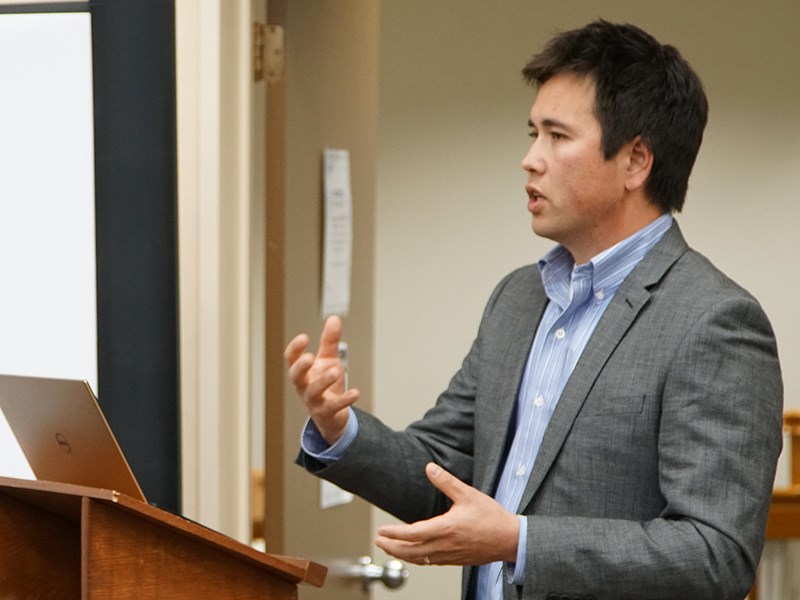Powell River’s 2020 to 2024 financial plan was outlined to City of Powell River Council and will be up for consideration in May.
At the April 28 council meeting, chief financial officer (CFO) Adam Langenmaier went over details of the budget, which, if adopted, will mean a 4.7 per cent municipal tax increase over 2019 for the average city dwelling and property.
Langenmaier said council approved a financial plan with an up to five per cent increase at the January 23 finance committee meeting. He said the municipal debt levy for the liquid waste treatment plant was included.
Langenmaier said this year, there is a reduction in the city’s flat tax, which is a set amount all households pay. It is dropping from $250 in 2019 to $180 in 2020. It will further drop to $115 in 2021 and $50 in 2022 and years thereafter.
The CFO then outlined the effect of various tax assessments on the average home, which would have an assessed value of $354,309. He said when all changes are added up, the difference for an average single-family dwelling will have a tax bill of $2,996,67, which represents a change from the prior year of $133.70.
Langenmaier said the next biggest tax revenue after residences is commercial properties. There are 425 commercial properties in Powell River with an average assessed value of $409,875. Langenmaier said they are seeing an average property tax increase in 2020 of $500 over the 2019 assessment. Taxes paid on an average commercial property is $7,666.
The CFO then reviewed the tax burden. He said residential properties account for 87.4 per cent of the assessment distribution in the city, while residential taxation brings in 65 per cent of the total taxes. Commercial represents 7.5 per cent of assessment distribution, while they provide 17.2 per cent of total taxation. Major industry, the Paper Excellence mill, is 4.7 per cent of the assessment distribution, and pays 16.6 per cent of the city’s tax bill.
Langenmaier said in terms of fees and charges in the city, there are changes as a result of COVID-19. He said, however, the reliability of information pertaining to the changes is too great for him to recommend making last minute alterations.
“What we can do is defer projects we don’t need to do right now,” said Langenmaier. “We can bring information back to council as we know more information on what our options are and what kind of issues we are facing. Addressing the COVID-19 impact on the city through changes to your financial plan wouldn’t be the best use of council’s time.”
Langenmaier said the city does not have ample excess taxation money to fund capital projects. He said funding for some is coming from city reserves. Some of the major capital projects in the 2020 budget include the library roof replacement, valued at $300,000, repairs to the library’s upper stucco rain screen, roof replace for the RCMP building, valued at $300,000 and purchase of a new street sweeper, with $250,000 coming from the equipment replacement reserve.
Langenmaier said to achieve a budget with very limited short-term borrowing, the recommendation was made to forego paving this year and put that money into roofing projects.
He recommended that the draft five-year financial plan go to the following week’s council meeting on May 7.
Councillor Jim Palm said when looking at what other municipalities are doing, they are rolling back their taxation. He said some are getting down to a zero per cent increase, but Powell River is in a unique situation, where it is hit with a double whammy: loss of jobs due to COVID 19 and curtailment at the Paper Excellence mill.
“It all factors in,” said Palm. “In our community we are in a unique time period where the future, we don’t know what it will hold. I will support this ask but I hate to do it.”
Councillor George Doubt, chair of the finance committee, said the impact to the average single-family dwelling for the general municipal tax is $88.25 and the average for the debt levy is $51.25, adding up to the $133 increase for the average household. He said if the levy for the wastewater treatment plant was not part of this year’s calculation, the increase for the average home would be 2.9 per cent, which is close to the rate of inflation.
“The rest of it is accounted for by the fact we are building a wastewater treatment plant that we have to build,” said Doubt. “It has debt and we’re going to have to pay it.”
Doubt said he has received correspondence from taxpayers that have indicated other municipalities have reduced the tax burden. He said in Tofino, it’s zero per cent. He said, however, that Tofino has dipped into reserves to pay for operating costs and they point out that over the next five years, they will have to recover those expenditures.
“You’re robbing Peter next year to pay Paul this year,” said Doubt. “They are also cutting back recreation and childrens’ programs. I don’t think we have to do that. This is a reasonable tax increase, particularly when you look at the fact we’re building the sewage treatment plant, which is going to be good for the environment.
“We are doing well compared to what other communities are doing and we are taking the long view and taking a look at the effect this is going to have on taxpayers down the road. It’s a reasonable five-year plan.”
Mayor Dave Formosa said he supports this year’s budget.
Councillor Rob Southcott said this budget is the best that can be done right now. He said council has the power to change this financial plan. Langenmaier said that is correct.
“We can fix it if we find it’s not good enough in the future,” said Southcott. “That gives me comfort and I’m hoping it will give others comfort as well.”



